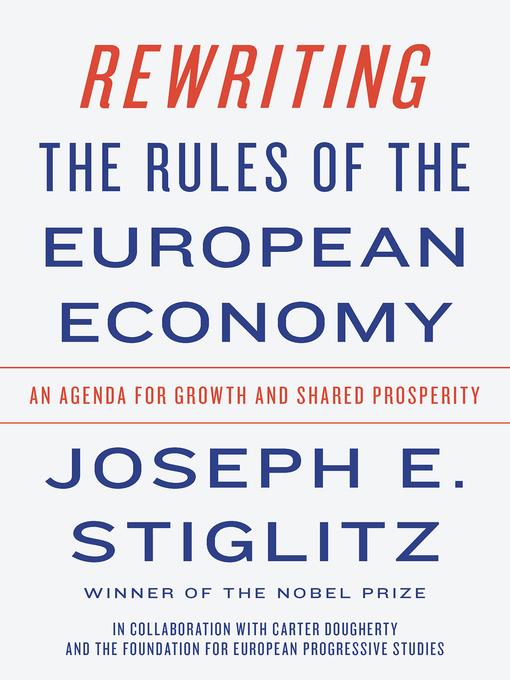
Rewriting the Rules of the European Economy
An Agenda for Growth and Shared Prosperity
کتاب های مرتبط
- اطلاعات
- نقد و بررسی
- دیدگاه کاربران
نقد و بررسی

November 1, 2019
Nobel Prize-winning economist Stiglitz (People, Power, and Profits: Progressive Capitalism for an Age of Discontent, 2019, etc.) turns a gimlet eye on the EU. The Brexiteers may be wolves in sheep's clothing, but they have a couple of points to make--e.g., the European economy is a tangled mess that defies explanation. A number of its key doctrines, writes the author, are mistaken and damaging. One is the "austerity doctrine," which requires governments to keep deficits below 3% of GDP, an arbitrary number that doesn't make sense. Another is a borrowing from the U.S. that the market knows best, when, "without strong government actions, competition will erode as firms create barriers to entry...and work hard to reduce competition through mergers and acquisitions." Debt is, of course, a difficult issue to work around, and European economic leaders have seen it through the lens of moral hazard: "the risk that the debt mutualization will incentivize countries to become overindebted." That may be, but something needs to give Europe a jolt, and it won't be borrowing from American ideas, which often yield only monopoly and inequality. Stiglitz notes, approvingly, that India has low telecom rates because there is so much competition, forcing prices down, while in places like Mexico and the U.S., rates are high because competition is scarce or nonexistent. The author offers recipes for improvement, such as shoring up the European banking union in order to "prevent macroeconomic harms to the community" and balancing competing doctrines. Europe has fallen behind the U.S. and China in some realms of the economy because of its concern for individual privacy, which hampers the development of artificial intelligence. Most pointedly, the author encourages the EU to stick to its regard for institutional justice, fostering multilateral agreements rather than following the current U.S. administration's "retreat from globalization and the global rule of law," which has benefited no country so much as China. A provocative and accessible case for making the EU stronger rather than allowing it to disintegrate.
COPYRIGHT(2019) Kirkus Reviews, ALL RIGHTS RESERVED.

January 1, 2020
Nobel Prize-winning economist Stiglitz, in collaboration with writer Carter Dougherty and The Foundation for European Progressive Studies, examines the European Union's rules, regulations, and institutions and offers alternatives with an eye toward revitalizing Europe's economy and creating widespread prosperity. They call for de-emphasizing the current policy of rigid anti-inflation austerity and suggest acting with fiscal flexibility and sharing the costs of crisis remedies across all member nations. They also propose both expanding the European Central Bank's mandate to include the promotion of full employment and making the ECB politically accountable. Other recommendations include increasing government investment to improve productivity and foster structural transformation, policing the marketplace and corporate governance more closely, improving taxation progressivity, strengthening labor protections, and enhancing the social welfare system. They further advise a massive rethinking of how the EU manages globalization. Stiglitz was lead author of a similar study, Rewriting the Rules of the American Economy. VERDICT This straightforward assemblage of practical solutions for revitalizing Europe's economy will have an audience with readers of Stiglitz's earlier work and anyone interested in economics.--Lawrence Maxted, Gannon Univ. Lib., Erie, PA
Copyright 2020 Library Journal, LLC Used with permission.

























دیدگاه کاربران